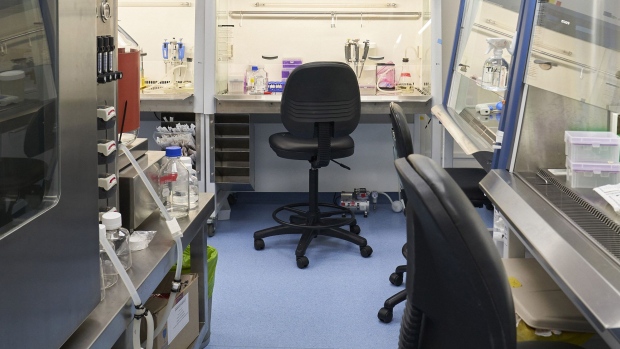Mar 10, 2023
SVB Meltdown Brings Another Blow to Cash-Starved Biotech Industry
, Bloomberg News

(Bloomberg) -- Biotech companies are racing to assess the damage from the failure at SVB Financial Group, the latest issue facing many of the startups in search of cash.
SVB, which collapsed Friday after a run on assets, plays a large role in financing early-stage life sciences and health-care companies. Venture-backed health companies account for 12% of SVB’s $173 billion of deposits and 36% of $168 billion in funds held off balance sheets as of year-end.
The SPDR S&P Biotech ETF closed down 3.9% while the Nasdaq Biotechnology Index fell 1.6%. The S&P 500 slipped 1.5%.
Like technology companies, biotech companies found themselves in a tough spot trying to decide what to do with money held at SVB, “an important financial partner” for the industry, John Maraganore, the former Alnylam Pharmaceuticals Inc. chief who’s involved with multiple investment firms and biotech boards, said in an interview.
The collapse of the best-known bank for venture-backed firms brings yet another blow for the industry contending with a prolonged downturn. Biotech companies had already been under intense pressure for more than a year as pandemic-fueled growth cooled and investors began to shun risky assets amid rising interest rates.
Read More: Silicon Valley Bank Collapses in Biggest Failure Since 2008
Most biotechs have assessed their exposure and started developing ways to mitigate it, Maraganore said early Friday. He said the last 24 hours were full of email exchanges and board calls about how to proceed.
Venture Capital
Labs at a startup incubator in Cambridge were abuzz Friday morning as SVB’s downfall appeared imminent, said Isaac Stoner, chief executive officer of closely held Octagon Therapeutics.
“Folks in the lab, folks in the office, everyone is talking about this,” he said.
Venture capital firms that fund other types of emerging health companies also felt SVB’s tremors. Bill Geary, co-founder at Flare Capital Partners, a venture firm focused on early-stage health technology investments, said all the firm’s portfolio companies were somewhat affected. Geary called the implications “profound” since SVB has played such an important role in the health-care ecosystem. As interest rates continue to rise, SVB’s meltdown could contribute to even more pessimism about the ability to raise capital, Geary said.
Read More: With VC Funding Drying Up, Biotechs Are on a Quest for Cash
“You can’t just look at any one of these things in isolation,” he said. “They all have kind of a compounded negative impact. This is just one example of how a financial institution that’s important in the value chain has been so dramatically impacted by rising interest rates.”
So far, public biotech companies appear shielded from the brunt of the damage. Most of those Evercore ISI analyst Josh Schimmer surveyed said they have limited exposure and aren’t expecting any material risks to their balance sheets.
“I’ve not found any company yet that has any material risk from this perspective, but there may be some disruption along the way,” Schimmer said Friday in a discussion on Twitter spaces.
(Updates shares in third paragraph)
©2023 Bloomberg L.P.






